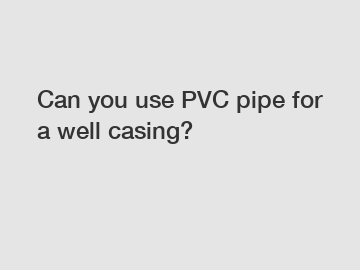Feb. 09, 2024
Rubber & Plastics
Can you use PVC pipe for a well casing?
When it comes to drilling a well, choosing the right materials is crucial for ensuring its longevity and efficiency. One important consideration is the type of pipe that will be used for the well casing. PVC (polyvinyl chloride) pipe is a popular option for a wide range of plumbing applications, but can it be used as a well casing? In this article, we will explore the suitability of PVC pipe for well casings and discuss its advantages and limitations.
Understanding Well Casings.

Before diving into the question of using PVC pipe for well casings, let's first understand the purpose and importance of this component. Well casing refers to the pipe that is installed in a drilled hole to support and protect the sides of the well. It serves as a barrier, preventing the collapse of the well hole, and also helps in keeping contaminants out, ensuring the quality of the water.
Advantages of PVC Pipe for Well Casings.
PVC pipe offers several advantages that make it a popular choice for various plumbing applications. These advantages also extend to well casings, making PVC an attractive option for certain situations.
1. Cost-effective: PVC pipe is generally more affordable compared to alternatives like steel or fiberglass. This can be especially beneficial if you need to drill a well on a tight budget.
2. Easy to install: PVC pipe is lightweight and easy to handle, which simplifies the installation process. The lightweight nature of PVC makes it an attractive choice for DIY well drilling projects.
3. Corrosion-resistant: Unlike metal pipes, PVC pipe is highly resistant to corrosion. This makes it well-suited for use in areas with aggressive soil conditions or high mineral content in the water.
4. Chemical resistance: PVC is resistant to many chemicals, making it a suitable choice for well casings in areas where the groundwater might contain corrosive elements.
Limitations of PVC Pipe for Well Casings.
While PVC pipe offers numerous advantages, it is important to acknowledge its limitations as well. These limitations might restrict its use in certain well drilling scenarios.
1. Depth limitations: PVC pipe is not recommended for deeper wells due to its relative lack of strength compared to alternatives like steel. The depth to which PVC pipe can be safely used depends on factors such as the diameter of the pipe, the soil conditions, and the water table level.
2. Pressure limitations: PVC pipe has lower pressure ratings compared to other materials like steel or HDPE (high-density polyethylene). This means it may not be suitable for wells that require high-pressure pumping systems.
3. Temperature limitations: PVC pipe is not suitable for use in extreme temperatures as it can become brittle when exposed to very cold conditions or soften under prolonged exposure to high temperatures.
Conclusion.
In conclusion, PVC pipe can be used for well casings in certain situations, depending on factors such as the depth of the well, the pressure requirements, and the temperature conditions. It offers several advantages, including affordability, ease of installation, corrosion resistance, and chemical resistance. However, it also has limitations, such as depth and pressure restrictions. Therefore, it is important to consult with a professional well driller or an experienced plumber to determine the suitability of PVC pipe for your specific well drilling project.
If you have any further questions or need assistance in drilling a well and choosing the right materials, please do not hesitate to contact us. Our team of experts is here to help you make the best decisions for your well project.
If you want to learn more, please visit our website hdpe pipe water supply, Dredge Pipe Floats For Sale, HDPE pipe floats.
Previous: How do you use thread sealant?
Next: The Ultimate Guide to HDPE Pipe Price: Uncover Surprising Savings and Factors Influencing Costs
If you are interested in sending in a Guest Blogger Submission,welcome to write for us!
All Comments ( 0 )